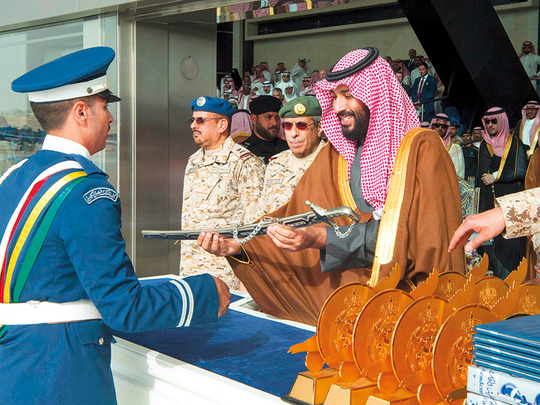
Manama: Saudi King Salman Bin Abdul Aziz on Monday, in a series of royal orders, appointed Tamader Bint Yousuf Bin Moqbil Al Rammah as Deputy Minister of Labour for Social Development, making her the first woman in Saudi Arabia to be appointed deputy minister in a new breakthrough in the political empowerment of women in the country.
As per the other Royal decrees issued by King Salman, Prince Badr Bin Sultan was appointed new emir of Al Jouf;
Prince Fahd Bin Badr was appointed adviser to the king with the rank of minister; Prince Turki Bin Talal appointed deputy emir of Asir; Prince Faisal Bin Fahd Bin Muqrin as deputy emir of Hail. Prince Faisal Bin Turki was appointed adviser at the Royal Court with the rank of minister, and Prince Sultan Bin Ahmad was appointed adviser at the Royal Court.
In a reshuffle of defence forces command, Lt. Gen. Fayad Al Ruwaili, deputy chief of staff, was promoted to general and appointed new chief of staff. The services of the Chief of Staff Gen. Abdul Rahman Al Bunyan were ended on retirement. He was appointed adviser at the Royal Court. No official reason was given for the changes, but they come as the kingdom’s conflict with the Iran-backed Al Houthi militia in Yemen nears the end of its third year.
The changes to the armed forces were announced as Saudi officers and executives from dozens of global defence companies gather in for an arms exhibition. Creating a domestic defence industry is a key goal of the kingdom’s plan to overhaul its economy. In another decree on Monday, the king approved a plan setting out a “vision and strategy” for the development of the Defence Ministry, according to the official Saudi Press Agency. Since King Salman named his son, Prince Mohammad Bin Salman as heir to the throne in June, the kingdom has witnessed a string of reforms, launched at breakneck speed and aimed at moving Saudi Arabia away from its economic dependence on oil.
According to News site Sabq, the changes at the Ministry of Defence are part of a new vision for the ministry that includes an operational model for development, an organisational structure, governance, and human resources requirements developed in the light of the national defence strategy.
The strategy promotes joint action and boosts responses to threats in ways that safeguard the interests and security of Saudi Arabia.
The restructuring of the Ministry is based on a new operational model that defines its roles to ensure national interests and the strategic objectives, the site said.
The development programme aims at raising the efficiency of spending through the Saudisation of the military industry, creating job opportunities and encouraging defence studies and research.
Work is under way to establish a joint permanent force command to promote joint action by the armed forces and to support partnership with allies and friends, Sabq said.
The Ministry of Defence wants to promote strategic air transport capabilities and logistics to enable it to increase responsiveness and flexibility.
The armed forces will modernise their military capabilities with high-tech weapons systems while the new operational model aims to increase transparency, by separating powers and responsibilities, and by implementing clear controls.
The Ministry of Defence’s development programme, in cooperation with the General Directorate of Medical Services of the Armed Forces, seeks to improve the medical care of personnel and their families.
In other changes to the defence establishment, Lt. Gen. Mohammad Suhaim, commander of the Air Defence Forces, was ordered to retire; Lt. Gen. Fahd Bin Turki, commander of the Land Forces, was relieved of his post and appointed commander of the Joint Forces; Maj. Gen. Mutlaq Al Azaimie was promoted to Lt. Gen. and appointed deputy chief of staff; Maj. Gen. Jarallah Al Olwait was promoted to Lt. Gen. and appointed commander of the Strategic Missiles Force; Maj. Gen. Fahd Al Mutair was promoted to Lt. Gen. and appointed commander of the Land Forces; Maj. Gen. Muzaid Al Amr was promoted to Lt. Gen. and appointed commander of Air Defence Forces; Maj. Gen. Turki Bin Bandar promoted to Lt. Gen. and appointed commander of the Air Forces.
Khalid Bayari, the Chief Executive Officer of Saudi Telecom Company (STC) was appointed assistant minister of defence for executive affairs.
Bayari is a proponent of strategies that include digital content, digital services and the information technology and has supported restructuring skills to focus on building new digital capabilities.
According to Saudi news site Al Marsad, the appointment of Bayari was “based on the Crown Prince’s interest in information technology management and in raising the standard of efficiency in a vital facility such as the Ministry of Defence”.
The post of Assistant Minister of Defence for Executive Affairs is a recently introduced position.
Prince Mohammad was working on re-energising the Ministry of Defence when his uncle the late King Abdullah was ruling Saudi Arabia.
“King Abdullah came to him with a huge assignment: Clean up the Ministry of Defence. Its problems had defied solutions for years,” Bloomberg reported in its interview with Prince Mohammad in 2016.
Previously, the legal department had become “marginalised,” which resulted in bad contracts that became “a big source of corruption.
The prince strengthened the law department and sent back dozens of contracts for revision. Many weapons purchases had been misconceived and inappropriately vetted, with no clear purpose. Prince Mohammad created an office to analyse arms deals, Bloomberg reported.










